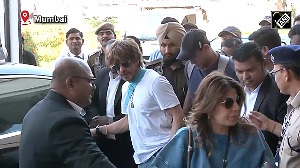Russia's Marat Safin made an impressive return from a six-month injury layoff on Tuesday when he beat compatriot and world number five Nikolay Davydenko 4-6, 6-2, 6-2 in the first round of the Dubai Open.
Safin had not played since August after a knee ligament tear he suffered at Wimbledon became too painful for him to continue.
"I didn't expect to win. It was a big surprise," Safin told reporters.
"Especially with the draw, I couldn't really think I would make even a set. I was coming out to play a few games and make sure I was moving okay and get back the rhythm."
Now ranked 53, the former world number one made a positive start, holding a break point in the second game that third seed Davydenko saved with an ace.
A double-fault from Safin gave his fellow Russian a break for 3-2 and Safin failed to convert three more break points as Davydenko served out the set.
"The first set I thought I had no chance whatsoever, even though I had break points, because I couldn't see the ball," said Safin. "I was lost on the court, basically.
"Everything was coming really fast. It was difficult to find when I have to go to the net, when to pressure, stay back. You lose this feeling a little bit, and everything was a little bit uncomfortable."
Things improved rapidly in the second set and Safin broke to lead 2-0 with a forehand winner.
He was able to fight off three break points at 3-1, two of them with aces, and he levelled the match by breaking again at 5-2.
Hitting his forehand well and ending with 10 aces, Safin always looked the more comfortable player in the final set.
Davydenko appeared unlikely to recover after he was broken to love in the second game and Safin closed out the match by breaking again with a strong forehand winner.
"I still have a little bit of pain," Safin said. "But it's not the same pain as it used to be and I can move without any problems.
"I'm just a little bit scared because it's difficult to reach some balls. You don't really want to run because it's still in your head that some movements that I made were really hurting me a year ago.
"So it's psychologically tough rather than physically."







 © 2025
© 2025